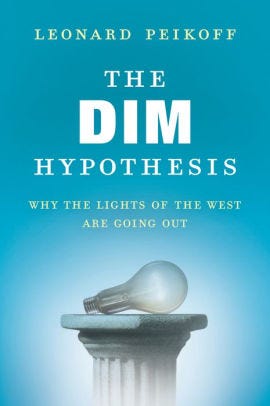“To save the world is the simplest thing in the world. All one has to do is think.” Leonard Peikoff, Objectivism: The Philosophy of Ayn Rand
Ninety years ago today, on October 15, 1933, Leonard Peikoff was born in Winnipeg, Manitoba, Canada.
He was raised by a family of physicians and intended to become a medical doctor. At age seventeen, he met Ayn Rand. He shortly changed his major to philosophy. Over the years, he became a close associate and student of Ayn Rand, contributing articles to her philosophic journals and applying her philosophy, Objectivism, to all branches of philosophy. He taught philosophy from New York to Colorado. Rand designated Peikoff her heir. When she died in 1982, he continued the annual spring tradition of delivering a speech at Boston’s Ford Hall Forum for many years. Enthusiastic fans traveled from all over the world to attend the event The New York Times referred to as “the Objectivist Easter”.
He wrote three books: The Ominous Parallels: The End of Freedom in America (1982); Objectivism: The Philosophy of Ayn Rand (1991); and The DIM Hypothesis: Why the Lights of the West are Going Out (2012). Others have transcribed and edited some of his lecture courses, radio shows, and podcasts into other books, including Understanding Objectivism, Objective Communication, and Keeping It Real: Bringing Ideas Down to Earth. Writing did not come easily to Peikoff, who, unlike Rand, considered himself more of a teacher than a writer. For that reason, Objective Communication is an invaluable guide. Just as some of the best sports coaches were those who had to work hard to learn their sport, many of the best teachers struggled to learn their skills.
Some of the central themes of Peikoff’s work are the crucial importance and indispensability of ideas in human life and the survival value of reason. In a culture that bombards everyone with antipodal ideas, Peikoff has been a lifelong advocate of reason and egoism (rational self-interest). In a culture of nihilism and false dichotomies like the mind/body dichotomy, Peikoff extols the virtue of integration, not only between mind and body but in all thought and art. In a culture he has described as anti-value, he emphasizes the importance of values in human life.
Controversial even among Objectivists, Peikoff has been an activist and advocate for human liberty and an intransigent champion of the West. He has advocated for numerous causes, from a woman’s right to abortion to the free speech of writers and artists. He raised awareness of Islamic terrorism years before it became a problem no one could ignore, predicting major terrorist attacks due to Western appeasement. He has been a stalwart critic of American foreign policy and a tireless advocate of America’s right to self-defense against Islamic and other threats.
All three of his major books are required reading. The Ominous Parallels explicates the German philosophy that led to the rise of Nazism and notes the disturbing trend of America becoming more German and more fascist (decades ago). Objectivism: The Philosophy of Ayn Rand is the first book-length systematization of Objectivism. (Rand wrote novels and essays but no book-length summation of her entire philosophy.) Objectivism’s epilogue, “The Duel Between Plato and Aristotle”, can be considered sort of an introduction or prelude to The DIM Hypothesis. He notes that, after Rand’s works, both Plato’s and Aristotle’s philosophies have been consistently stated, eliminating any contradictions in the works of the great Greek thinkers. He describes the philosophy of Immanuel Kant, whom Rand described as the most evil man in history (if there are degrees of evil), as Platonism without paganism. He considers Rand’s philosophy Aristotelianism without Platonism. (Rand was a significant admirer of Aristotle, whom she called “the Grandmaster of all Grandmasters” in “An Open Letter to Boris Spassky”, but she thought Aristotle’s philosophy was undercut by contradictory ideas influenced by his teacher Plato.)
In The DIM Hypothesis, the author identifies three essential approaches to thought that have dominated Western civilization at various times. Integration, the method of Aristotle, unites concrete data into a whole based on rational means; misintegration, the method of Plato, unites concrete data based on non-rational means; and disintegration, the method of Kant, actively tears apart thought, art, and culture. Dismissing false dichotomies (variations of misintegration and disintegration), Peikoff considers culture often as a trichotomy, with the true alternative, integration, marginalized. He applies his method of analysis to four major cultural areas: literature, physics, education, and politics. The underrated work is a warning, largely unheeded and ignored even by Rand’s fans, to a declining West dying from disintegration and nihilism. It is also a rallying cry to return to integration, the method of thought that led to the West’s greatest achievements.
Some of his most perspicacious lectures and speeches include “Modernism and Madness” and “The Survival Value of Great (Though Philosophically False) Art”. The former considers the parallels between modern art and culture and mental illness, particularly schizophrenia. In the latter, he demonstrates why great art and literature, even with false themes, is a requirement of human life, with examples from some of his favorite writers.
Largely retired from philosophy, Peikoff writes science fiction now. Hopefully, he will publish some.
Scott Holleran has written an excellent tribute to his mentor at his indispensable page Autonomia: “Just Deserts: A Philosopher for the Living”.
Leonard Peikoff’s life and continued work is certainly worth celebrating on his ninetieth birthday and thereafter. His ideas and his indefatigable intellectual activism can reverse the looming collapse of the vestiges of Western culture.


